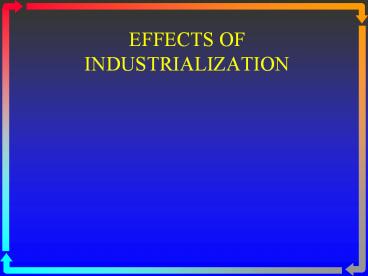EFFECTS OF INDUSTRIALIZATION - PowerPoint PPT Presentation
1 / 19
Title:
EFFECTS OF INDUSTRIALIZATION
Description:
EFFECTS OF INDUSTRIALIZATION CAPITALISM Private Ownership & Free Enterprise system: Capital belongs to individuals who are free to do as they like with it. – PowerPoint PPT presentation
Number of Views:54
Avg rating:3.0/5.0
Title: EFFECTS OF INDUSTRIALIZATION
1
EFFECTS OF INDUSTRIALIZATION
2
CAPITALISM
- Private Ownership Free Enterprise system
Capital belongs to individuals who are free to do
as they like with it. - Profit Motive base on the Law of Supply Demand
When people want a product, producers will supply
it to make a profit - Free Market Economy Buyers sellers are free to
exchange goods services at prices determined by
supply demand - Competition shapes Market consumers buy best
goods for lowest price - Laissez Faire Economics govt doesnt interfer
- -Employers take advantage of workers
- - Unequal distribution of wealth
3
SIZE OF CITIES
- Rural to Urban Cities double, triple, quadruple
in size - Factories develop near sources of energy
- New industrial cities specialize in certain
industries - Growth Middle Class
- Huge variety of goods produced cheaply
affordable to more people
4
LIVING CONDITIONS
- No sanitary codes or building controls
- Lack of adequate housing, education, police
- Lack of running water and indoor plumbing
- Frequent epidemics sweep through slums
- Eventually, better housing, healthier diets, and
cheaper clothing
5
WORKING CONDITIONS
- New jobs for more workers
- Workers must keep pace with machines
- Factories dirty and unsanitary
- Workers run dangerous machines for long hours in
unsafe conditions - Harsh and severe factory discipline
- Eventually, higher wages, shorter hours, and
better working conditions
6
Effects of Machinery on Labor
- The Luddites
- People loose jobs to machines
- Luddites purposely damage factory machines in
attempt to maintain their jobs - Luddites will cause riots
- Eventually the riots will be put down and the
Luddites jailed
7
EMERGING SOCIAL CLASS
- Upper Class of landowners and aristocrats
resentful of rich middle class - Industrial Middle Class of factory owners,
shippers, and merchants - Lower Middle Class of factory overseers and
skilled workers - Industrial Workers - overworked and under paid
- In general, a rising standard of living, with
some groups excluded
8
Reform Movements
- Labor Unions by 1900 regulate factories for
safer conditions, shorter hours, and better pay - City Services by 1900, life in cities improve
Sewage systems, police forces, building codes,
hospitals - Education-Free education for children in all
industrialized nations
9
Education
- Industrial jobs require higher education
- Voting requires an educated citizenry
- Compulsory education demand for teachers
(women) - Literacy expands mass media develops
newspapers for reading public
10
Womens Rights
- Feminism the movement for womens rights
- Women fight and win rights to property,
education, and enter professions and occupations
dominated by men ie medicine, law, politics - Suffrage (vote) key to gaining equal rights.
Suffragettes protest to gain attention police
answer with arrests and brutal treatment - (Iron Jawed Women)
11
Growth of Democracy
- Franchise/suffrage the right to vote Extended
to most men and later to women (1918 in Britain
1920 in U.S.)
12
SOCIALISM
- Society usually in the form of a government
owns and controls important parts of the economy
(factories utilities). - This public ownership of the means of production
allow wealth to be distributed more equally to
everyone. - Replace competition with cooperation
13
Communism
- Karl Marx writes The Communist Manifesto
workers (Proletariat) would unite and violently
overthrow the capitalists (bourgeoisie). A
dictatorship of the proletariat would abolish
capitalism and create a socialist economy when
the economy stabilized, a classless society would
emerge.
14
NEW SCIENCE
- Edward Jenner smallpox vaccine
- Louis Pasteur germ theory
- Secularization indifference to religion in the
affairs of everyday life - Charles Darwin Origins of the Species by Means
of Natural Selection survival of the fittest and
organic evolution
15
ROMANTICISM
- Reaction against Enlightenment classicism (reason
balance) - Art expresses feeling, emotion, imagination of
artist or writer - Mary Shelleys Young Frankenstein
- Edgar Allan Poe horror stories
- Ludwig van Beethoven
16
Eugene Delacroix
17
REALISM
- Charles Dickens shows realities of life of the
poor in the early Industrial Age - Oliver Twist
- David Copperfield
- Illustrate the brutal life of Londons poor
18
REALISM
- Artist Gustave Courbet portray scenes of everyday
life
19
IMPERIALISM
- Increased need for even more NATURAL RESOURSES
RAW MATERIALS for Industry lead strong industrial
nations to exploit weak nations for their
resources and location































